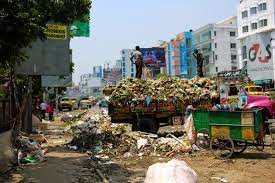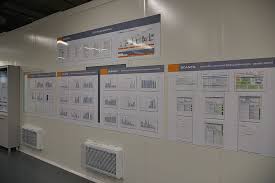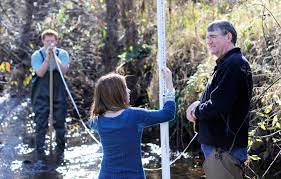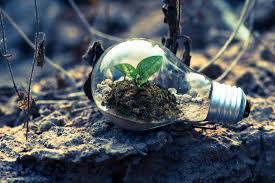Land Pollution and Composition of Land Pollution
Land pollution is a common and destructive phenomenon today. Read on to learn about its various causes and effects. Pollution is a global problem. It has affected the lives of millions of people and caused several deaths and health problems. Land pollution is one of the types of pollution.
Meaning of Land Pollution
A number of definitions have been proffered in explaining what land pollution is. These include:
Land pollution basically is about contaminating the land surface of the Earth through dumping of urban waste matter indiscriminately, dumping of industrial waste, mineral exploitation, and misusing the soil by harmful agricultural practices.
Land pollution includes visible litter and waste alone with the soil itself being polluted. The soil gets polluted by the chemicals in pesticides and herbicides used for agricultural purposes along with waste matter being littered in urban areas such as roads, parks, and streets.
Land pollution is the degradation of the Earth’s land surface through misuse of the soil by poor agricultural practices, mineral exploitation, industrial waste dumping, and indiscriminate disposal of urban wastes. It includes visible waste and litter as well as pollution of the soil itself.
Land pollution is pollution of our planet’s land surface.
Composition of Land Pollution
1. Solid Waste
Solid wastes are unwanted solid materials such as garbage, paper, plastics and other synthetic materials, metals, and wood. Semisolid or solid matters that are created by human or animal activities, and which are disposed because they are hazardous or useless are known as solid waste.
Most of the solid wastes, like paper, plastic containers, bottles, cans, and even used cars and electronic goods are not biodegradable, which means they do not get broken down through inorganic or organic processes.
Read Also : The Major Effects of Water Pollution
Thus, when they accumulate they pose a health threat to people, plus, decaying wastes also attract household pests and result in urban areas becoming unhealthy, dirty, and unsightly places to reside in.
Moreover, it also causes damage to terrestrial organisms, while also reducing the use of the land for other, more useful purposes. Billions of tons of solid waste are thrown out annually.
Waste from developed countries typically contains a high percentage of synthetic materials that take longer to decompose than the primarily biodegradable waste materials of developing countries.
Areas where wastes are buried, called landfills, are the cheapest and most common disposal method for solid wastes worldwide. But landfills quickly become overfilled and may contaminate air, soil, and water.
Incineration, or burning, of waste reduces the volume of solid waste but produces dense ashen wastes (some of which become airborne) that often contain dangerous concentrations of hazardous materials such as heavy metals and toxic compounds.
Composting, using natural biological processes to speed the decomposition of organic wastes, is an effective strategy for dealing with organic garbage and produces a material that can be used as a natural fertilizer.
Recycling, extracting and reusing certain waste materials, has become an important part of municipal solid waste strategies in developed countries. Expanding recycling programs worldwide can help reduce solid waste pollution, but the key to solving severe solid waste problems lies in reducing the amount of waste generated.
Waste prevention, or source reduction, such as altering the way products are designed or manufactured to make them easier to reuse, reduces the high costs associated with environmental pollution.
Some of the sources of solid waste that cause land pollution are:
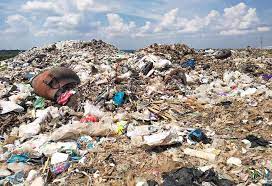
Wastes from Agriculture: This comprises of waste matter produced by crop, animal manure, and farm residues.
Wastes from Mining: Piles of coal refuse and heaps of slag.
Wastes from Industries: Industrial waste matter that can cause land pollution includes paints, chemicals, and so on.
Solids from Sewage Treatment: Wastes that are left over after sewage has been treated, biomass sludge, and settled solids.
Ashes: The residual matter that remains after solid fuels are burned.
Garbage: This comprises of waste matter from food that are decomposable and other waste matter that are not decomposable such as glass, metal, cloth, plastic, wood, paper, and so on.
2. Soil Pollution
Soil pollution is the buildup in soils of persistent toxic compounds, chemicals, salts, radioactive materials, or disease-causing agents, which have adverse effects on plant growth and animal health.
As of now, soil pollution is not widespread. Although the application of fertilizers containing the primary nutrients, nitrogen, phosphorus, and potassium, has not led to soil pollution, the application of trace elements has.
The irrigation of arid lands often leads to pollution with salts. Sulfur from industrial wastes has polluted soils in the past, as has the accumulation of arsenic compounds in soils following years of spraying crops with lead arsenate.
The application of pesticides has also led to short-term soil pollution. Unhealthy soil management methods have seriously degraded soil quality, caused soil pollution, and enhanced erosion.
Treating the soil with chemical fertilizers, pesticides, and fungicides interferes with the natural processes occurring within the soil and destroys useful organisms such as bacteria, fungi, and other microorganisms.
Soil pollution is chiefly caused by chemicals in pesticides, such as poisons that are used to kill agricultural pests like insects and herbicides that are used to get rid of weeds. Hence, soil pollution results from:
Unhealthy methods of soil management.
Harmful practices of irrigation methods.
In summary,as human populations increase and their encroachment on natural habitats expands, humans are having detrimental effects on the very ecosystems on which they depend.
The survival of natural ecosystems around the world is threatened by many human activities: bulldozing wetlands and clear-cutting forests the systematic cutting of all trees in a specific area to make room for new housing, road construction and agriculture, all lead to land pollution.
Land pollution is contaminating the land surface of the Earth through dumping urban and industrial waste indiscriminately as well as mineral exploitation, and misusing the soil by harmful agricultural practices.
Solid wastes are unwanted solid materials such as garbage, paper, plastics and other synthetic materials, metals, and wood.
Areas where wastes are buried are called landfills and are the cheapest and most common disposal method for solid wastes worldwide.
Read Also : Water Pollution Sources and Classifications
Expanding recycling programs worldwide can help reduce solid waste pollution, but the key to solving severe solid waste problems lies in reducing the amount of waste generated by individuals.
Soil pollution is the buildup in soils of persistent toxic compounds, chemicals, salts, radioactive materials, or disease-causing agents, which have adverse effects on plant growth and animal health.
Unhealthy soil management methods have seriously degraded soil quality, caused soil pollution, and enhanced erosion.
